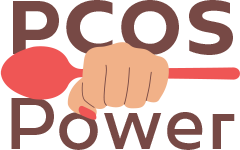This article was written by my previous Nutrition Grad Student, Kimmie Singh. She is a fat woman of color who experiences PCOS. You can find out more information about her work now as a dietitian here.
Ever wonder why you feel so much more tired than your friends without PCOS? This is just one side effect of chronic inflammation. Understanding inflammation can significantly impact your PCOS and your life. Kimberly Singh, dietitian-in-training, has dug into the research to help us understand more about it. —Julie
Your body is a complex system with many awing processes. It has strong defense mechanisms that are trying to protect you at all times and healing mechanisms that respond to an attack in the form of an injury or infection. Inflammation is a crucial part of the body’s defense!
I know inflammation usually gets a bad rap, but it plays a major role in the healing process after an injury.
Take a moment to remember an accident that left you with a red, swollen, painful lump.
Maybe it was falling off your bike as a child or a silly fall that left you with a great story as an adult. I’m a bit clumsy, so too many examples come to mind! After that fall or accident, you may remember the place of injury getting hot, red, swollen, and painful almost immediately. This is your body’s natural process of responding to an attack.
I know that feeling is far from fun, but a lot is going on to heal and protect the area from further injury.
Talk about tough love.
This process is called acute inflammation. It happens suddenly usually in response to an injury or infection, and it doesn’t stick around for too long.
Chronic inflammation is a little different. Instead of suddenly popping up after an injury or infection, it’s less intense and lingers around. Chronic low-grade inflammation is common in a variety of health conditions, including PCOS.
Want to find a way to treat your PCOS without dieting?
Grab a FREE download from Julie here.
So now that you know how helpful inflammation can be, I should tell you why it has such a bad reputation. Chronic low-grade inflammation increases the risk for developing conditions we are told we do not want. They include:
- coronary heart disease
- stroke
- insulin resistance
- irritable bowl syndrome
- chronic pain.
These may sound particularly familiar because they are also common in people with PCOS.
Knowledge is key here: reducing chronic low-grade inflammation can reduce the risk of PCOS comorbidities.
Stay tuned for posts that discuss how to combat some of the effects of chronic inflammation. Here are some quick tips to reduce chronic inflammation:
- Be sure to eat enough. Regardless of your size, dieting will increase inflammation.
- Enjoy foods that are rich in omega-3 fatty acids.
- Be sure to get enough vitamin D, so soak up the sun and grab your favorite yogurt.
- Enjoy movement and avoid over exercising. Find ways to explore movement that you love.
- Get enough sleep.
- Manage stress with therapy, meditation, yoga, etc.
- Enjoy your favorite fruits and veggies. I find it helpful to experiment with new recipes to make veggies a bit more exciting.
Want to explore more non diet options to help manage your PCOS, promote health AND healing?
Click here for details on Julie’s PCOS and Food Peace course.
References
Akiho, H. (2010). Low-grade inflammation plays a pivotal role in gastrointestinal dysfunction in irritable bowel syndrome. World Journal of Gastrointestinal Pathophysiology, 1(3), 97. doi:10.4291/wjgp.v1.i3.97
Barbosa-Da-Silva, S., Fraulob-Aquino, J. C., Lopes, J. R., Mandarim-De-Lacerda, C. A., & Aguila, M. B. (2012). Weight Cycling Enhances Adipose Tissue Inflammatory Responses in Male Mice. PLoS ONE, 7(7). doi:10.1371/journal.pone.0039837
Bauer, B. (n.d.). Buzzed on inflammation: From the Editors: Mayo Clinic Health Letter. Retrieved June 14, 2017, from http://healthletter.mayoclinic.com/editorial/editorial.cfm/i/163/t/Buzzed%20on%20inflammation/
Beavers, K. M. (2011). Effects of lifestyle interventions on inflammatory markers in the metabolic syndrome. Frontiers in Bioscience, S3(1), 168-177. doi:10.2741/s142
González, F. (2012). Inflammation in Polycystic Ovary Syndrome: Underpinning of insulin resistance and ovarian dysfunction. Steroids, 77(4), 300-305. doi:10.1016/j.steroids.2011.12.003
Lasselin, J., Kemani, M. K., Kanstrup, M., Olsson, G. L., Axelsson, J., Andreasson, A., . . . Wicksell, R. K. (2016). Low-grade inflammation may moderate the effect of behavioral treatment for chronic pain in adults. Journal of Behavioral Medicine,39(5), 916-924. doi:10.1007/s10865-016-9769-z
Mangin, M., Sinha, R., & Fincher, K. (2014). Inflammation and vitamin D: the infection connection. Inflammation Research, 63(10), 803-819. doi:10.1007/s00011-014-0755-z
Mullington, J. M., Simpson, N. S., Meier-Ewert, H. K., & Haack, M. (2010). Sleep loss and inflammation. Best Practice & Research Clinical Endocrinology & Metabolism, 24(5), 775-784. doi:10.1016/j.beem.2010.08.014
Repaci, A., Gambineri, A., & Pasquali, R. (2011). The role of low-grade inflammation in the polycystic ovary syndrome. Molecular and Cellular Endocrinology, 335(1), 30-41. doi:10.1016/j.mce.2010.08.002
Petersen, A. M. (2005). The anti-inflammatory effect of exercise. Journal of Applied Physiology, 98(4), 1154-1162. doi:10.1152/japplphysiol.00164.2004
Publications, H. H. (n.d.). Foods that fight inflammation. Retrieved July 03, 2017, from http://www.health.harvard.edu/staying-healthy/foods-that-fight-inflammation
Slavich, G. M., & Irwin, M. R. (2014). From stress to inflammation and major depressive disorder: A social signal transduction theory of depression. Psychological Bulletin, 140(3), 774-815. doi:10.1037/a0035302
What is an inflammation? (2015, January 07). Retrieved June 14, 2017, from https://www.ncbi.nlm.nih.gov/pubmedhealth/PMH0072482/





